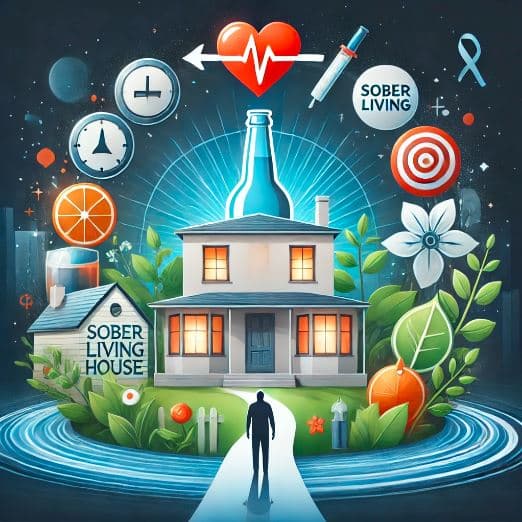Alcohol addiction is a pervasive issue that not only affects individuals on a personal level but also has a profound impact on public health. The health effects of alcohol addiction can be devastating, leading to a range of physical and mental health problems. For those struggling with alcohol abuse, finding the right path to recovery is crucial. One of the most effective methods is through the support of a sober living house. These homes provide a structured and supportive environment that can significantly enhance the alcohol addiction recovery process.
Which Conditions are Often a Result of Alcohol Addiction?
Alcohol addiction can have severe consequences on an individual’s health. The impact of alcohol on health is wide-ranging, affecting almost every organ in the body. Here are some of the key health risks associated with alcohol addiction:
- Liver Disease: Chronic alcohol consumption is a leading cause of liver disease, including fatty liver, hepatitis, and cirrhosis. The liver, which is responsible for metabolizing alcohol, becomes overworked and damaged over time, leading to severe health problems.
- Cardiovascular Issues: Alcohol abuse can lead to high blood pressure, heart disease, and an increased risk of stroke. The health effects of alcohol addiction on the cardiovascular system are particularly concerning, as they can lead to life-threatening conditions.
- Neurological Damage: Excessive alcohol consumption can cause significant damage to the brain, leading to memory loss, cognitive impairment, and an increased risk of developing conditions like dementia and Alzheimer’s disease.
- Mental Health Disorders: Alcohol addiction is closely linked to mental health issues such as depression, anxiety, and bipolar disorder. These conditions can be exacerbated by alcohol, creating a vicious cycle that is difficult to break.
- Gastrointestinal Problems: Alcohol can irritate the digestive system, leading to conditions like gastritis, pancreatitis, and an increased risk of developing stomach cancer.
Given these risks, it is essential for those struggling with alcohol addiction to seek help as soon as possible. One of the most effective ways to begin the journey to recovery is through a sober living house.
The Benefits of Sober Living Houses in Alcohol Addiction Recovery
A sober living house offers a unique and supportive environment for individuals in alcohol addiction recovery. These homes are designed to provide a safe and structured space where residents can focus on their recovery without the distractions and temptations of the outside world. Here are some of the key benefits of sober living homes:
- Structured Environment: A sober living house provides a daily routine that includes responsibilities, chores, and meetings. This structure helps individuals build discipline and accountability, which are essential for long-term alcohol addiction recovery.
- Peer Support: One of the most significant advantages of a sober living house is the opportunity to connect with others who are going through similar experiences. This peer support can be incredibly valuable, offering encouragement and understanding from those who truly understand the challenges of recovery.
- Access to Resources: Residents of sober living homes often have access to a variety of resources, including therapy, counseling, and addiction recovery programs. These resources can provide the tools and support needed to maintain sobriety.
- Transitional Support: For many individuals, leaving a treatment center and returning to everyday life can be overwhelming. A sober living house provides a transitional space where residents can gradually reintegrate into society while still receiving the support they need.
- Reduced Risk of Relapse: The sober living recovery environment is designed to minimize the risk of relapse. With the support of the community and the structure of the house, residents are better equipped to handle triggers and challenges without turning to alcohol.
The Role of Sober Living Houses in Preventing Relapse
Relapse is a common concern for individuals in alcohol addiction recovery. The temptation to return to old habits can be strong, especially when faced with stress or difficult situations. This is where the role of a sober living house becomes crucial.
- Accountability: In a sober living house, residents are held accountable for their actions. This accountability, combined with the support of the community, helps individuals stay on track with their recovery goals.
- Ongoing Support: Alcohol addiction recovery is an ongoing process, and having access to continuous support is essential. Sober living homes provide a space where individuals can continue to receive guidance and encouragement long after they have completed formal treatment.
- Building Healthy Habits: One of the key aspects of recovery is learning how to live a healthy, balanced life without alcohol. Sober living recovery helps individuals develop new routines and habits that support their sobriety, such as regular exercise, healthy eating, and mindfulness practices.
- Gradual Reintegration: Returning to daily life after treatment can be daunting. A sober living house provides a gradual transition, allowing residents to slowly rebuild their lives while still receiving support.
Take the First Step with Haven House Sober Living
Alcohol addiction recovery is a challenging journey, but with the right support, it is entirely possible. At Haven House Sober Living, we are committed to providing a safe, structured, and supportive environment for individuals seeking to reclaim their lives from alcohol addiction. Our sober living house offers everything you need to achieve lasting sobriety, from peer support to access to essential resources.
Don’t wait to take the first step toward recovery. Contact Haven House Sober Living today and discover how we can help you build a healthier, happier future. Visit our Contact Us page to get started on your path to sobriety.

